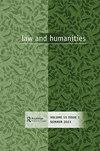AnteEditorial: a personal reflection on law and humanities
IF 0.2
Q3 LAW
引用次数: 0
Abstract
At an interdisciplinary university event a few years ago, I found myself sitting beside two colleagues from Music: one of whom I knew slightly, the other I had never previously met. The colleague I had never met asked me which department I was from. ‘I’m from Law’, I said. Her response – ‘Oh – how boring!’ took me by surprise since the orthodoxy of her question had led me to assume that her response would also be blandly amiable. The event was about to start so there was no time for me to discover what exactly my new acquaintance meant by this, let alone respond adequately to it. I can only guess that for this Music scholar, the study of ‘law’ meant studying ‘rules’, and that rules are contained in tedious lists of do’s and don’ts. Stirred to say something by the personal implications that her remark carried about me, but mindful of the difficulty of refuting so firmly stated a view of law in a few moments without sounding defensive, I decided that I could defend only my own corner of it. With a silent apology to my colleagues of various other legal scholarly hues then, I mentioned that the ‘law and humanities’ approach that I use means that I get to read, not merely the legal authorities, but also all manner of interesting sources from the arts. In other words, rather than trying to refute her point, I limited my aim to pointing out a well-established figurative bridge between our respective subjects. Of course, my defence was not merely limited; it was also an act of moral cowardice or even outright betrayal, privileging the particular (me and my self-image) over the general (the character of law as a subject of study andmy colleagues), and relying on a distinction between ‘dry law’ and ‘exciting arts’ that I happen to believe to be a false and damaging stereotype. But what else could I do under those circumstances? Perhaps I would have done better had I been prepared to violate the social and professional conventions at play: that audience members stop talking when an event starts; that one should not try to impose on others the burden of being party to such a violation; that one should avoid self-defensiveness; that one should not seek to pursue a point after it has ceased to be appropriate to do so, or its resolution interesting to the other. It strikes me now that this reflection about social norms also stands as a fitting response to my Music colleague’s position, in that it illustrates that the rules that structure and constrain our behaviours are everywhere and all around, external and internal as well, and that these very often pertain to conventional expectations about the right and a wrong time to act or speak. In the common law too, we find that time is crucial to notions of authority and application – perceived continuities and discontinuities between past, present and future determine the relevance or irrelevance of events as guides for present legal questions, and the prospects that these will in turn be looked to as indicators of where we are going next. Professor David Gurnham, Southampton Law School前社论:法律与人文的个人反思
几年前,在一次跨学科的大学活动中,我发现自己坐在两位音乐专业的同事旁边:其中一位我知之甚少,另一位我以前从未见过。我素未谋面的同事问我是哪个部门的。“我是法律系的,”我说。她的回答是——“哦——多么无聊!这个问题让我很吃惊,因为她的问题正统,让我以为她的回答也会是温和可亲的。活动即将开始,所以我没有时间去发现我的新朋友到底是什么意思,更不用说做出适当的回应了。我只能猜测,对于这位音乐学者来说,研究“法律”意味着研究“规则”,而这些规则包含在冗长的“做与不做”的清单中。她的话给我带来了个人的暗示,我很想说点什么,但我又意识到,要在几分钟内反驳如此坚定的法律观点而又不听起来像是在为自己辩护,这是很困难的。我决定,我只能为自己的观点辩护。我向我的其他各种法律学术色彩的同事们默默道歉,我提到我使用的“法律和人文”方法意味着我不仅要阅读法律权威,还要阅读各种有趣的艺术来源。换句话说,我并没有试图反驳她的观点,而是将我的目标局限于指出我们各自主题之间建立起来的比喻桥梁。当然,我的辩护不仅是有限的;这也是一种道德上的怯懦,甚至是彻头彻尾的背叛,把特殊的东西(我和我的自我形象)置于一般的东西(法律作为一门研究课题和我的同事们的特点)之上,并依赖于“枯燥的法律”和“令人兴奋的艺术”之间的区别,我碰巧认为这是一种错误的、有害的刻板印象。但在这种情况下,我还能做什么呢?如果我准备好违反社交和职业惯例,也许我会做得更好:当活动开始时,观众会停止说话;任何人都不应试图把作为这种侵犯行为一方的负担强加给他人;一个人应该避免自我防卫;一个人不应该在一个问题已经不适合继续下去,或者它的解决方法对另一个人来说已经不感兴趣了。现在我突然意识到,这种对社会规范的反思也正好回应了我的音乐同事的立场,因为它说明了结构和约束我们行为的规则无处不在,无处不在,既有外部的,也有内部的,而且这些规则通常与关于行动或说话的正确时间和错误时间的传统预期有关。在普通法中,我们也发现时间对于权威和应用的概念是至关重要的——过去、现在和未来之间可感知的连续性和不连续性决定了作为当前法律问题指南的事件的相关性或不相关性,而这些事件的前景将反过来被视为我们下一步走向的指标。David Gurnham教授,南安普顿法学院
本文章由计算机程序翻译,如有差异,请以英文原文为准。
求助全文
约1分钟内获得全文
求助全文
来源期刊

Law and Humanities
LAW-
CiteScore
1.00
自引率
0.00%
发文量
21
期刊介绍:
Law and Humanities is a peer-reviewed journal, providing a forum for scholarly discourse within the arts and humanities around the subject of law. For this purpose, the arts and humanities disciplines are taken to include literature, history (including history of art), philosophy, theology, classics and the whole spectrum of performance and representational arts. The remit of the journal does not extend to consideration of the laws that regulate practical aspects of the arts and humanities (such as the law of intellectual property). Law and Humanities is principally concerned to engage with those aspects of human experience which are not empirically quantifiable or scientifically predictable. Each issue will carry four or five major articles of between 8,000 and 12,000 words each. The journal will also carry shorter papers (up to 4,000 words) sharing good practice in law and humanities education; reports of conferences; reviews of books, exhibitions, plays, concerts and other artistic publications.
 求助内容:
求助内容: 应助结果提醒方式:
应助结果提醒方式:


